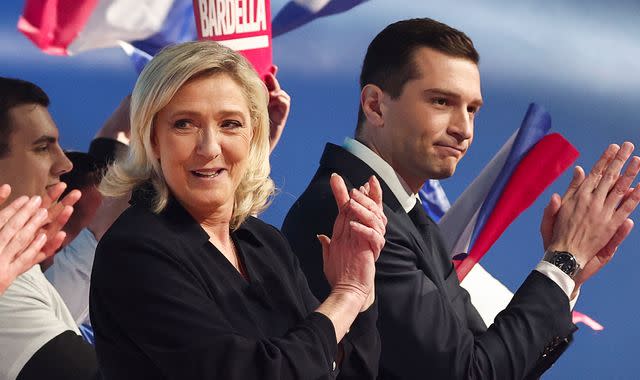French election: What is Marine Le Pen's National Rally party and could it take control?

Marine Le Pen's far-right National Rally party made its biggest gains ever in the first round of voting in Emmanuel Macron's snap parliamentary election.
The French president, who was been in power since 2017, said it was time for the country to have its say after his centrist Renaissance party suffered a calamitous result in the European elections on 10 June.
But his gamble appeared to backfire after National Rally emerged with the largest vote share on 30 June - almost double what it achieved in the 2022 presidential election.
If they secure victory in the second round and become the largest party in the National Assembly - Ms Le Pen's protege could become France's new prime minister.
What's happened?
Mr Macron called a snap election after being trounced in European Parliament elections by National Rally.
The far-right party won about 32% of the vote in France - about twice as much as Mr Macron's pro-European party on 15%.
He told the nation from the Elysee Palace in Paris: "I've decided to give you back the choice of our parliamentary future through the vote. I am therefore dissolving the National Assembly."
He went on: "I have heard your message, your concerns, and I will not leave them unanswered. France needs a clear majority in order to act with serenity and harmony."
The vote took place across two rounds - the first on 30 June and the second on 7 July.
National Rally came out top in the first round, with 33%, followed by the left-wing New Popular Front on 29%, and Mr Macron's Renaissance party with 22%.
This election is different to the presidential ones, determining instead which parties hold the 577 seats in the National Assembly - the lower of the two French houses of parliament - not which president inhabits the Elysee.
What is National Rally?
National Rally, (Rassemblement National or RN) is a nationalist and populist right-wing party, which has benefited from the rise of the right across Europe.
Until 2018, it was known as the National Front but, in a bid to improve its image, it rebranded as Ms Le Pen worked to try and soften the party's image and shake off long-standing accusations of racism and antisemitism.
Founded in 1972 by Jean-Marie Le Pen, Ms Le Pen's father, today the party is led by Jordan Bardella, a 28-year-old who has been fast-tracked to political leadership.
They are the single biggest opposition party with 88 MPs and are hoping to appeal to what they say are the people of France's main concerns - immigration, the cost of living and crime.
National Rally takes a hard line on immigration, wanting to drastically curb it, and although it no longer wants to leave the EU, it has said it would reform it.
Despite moderating its tone in recent years, National Rally is still considered a far-right party whose ascent to power would change Europe noticeably.
How has National Rally reacted?
Ms Le Pen, who was widely seen as the frontrunner for the 2027 election in which Mr Macron is unable to stand, welcomed his decision.
"We are ready to take power if the French people have confidence in us in these forthcoming legislative elections," she said.
"We are ready to put the country back on its feet."
Read more:
Europe decides - how will election shape continent politics?
RN's lead candidate for the EU election and Ms Le Pen's protege, Mr Bardella, may only be 28, but he immediately took on a presidential air with his victory speech in Paris.
Mr Bardella, who is also the party's president, addressed his "Dear compatriots" and went on to say: "The French people have given their verdict, and it's final."
Will the parliamentary election affect the presidency?
Mr Macron took a big risk with the snap vote since his party is likely to suffer more losses, hobbling the rest of his presidential term which comes to an end in 2027.
If his party ends up losing, Mr Macron, who in the last recorded week had a mere 21% approval rating, according to Morning Consult, may be forced into "cohabitation".
This term refers to when the president is forced to stand alongside a prime minister from an opposing party.
It happened to right-wing president Jacques Chirac in 1997, when he called a snap election only for the left to win.
If National Rally wins a majority, Mr Macron would still remain as president, overseeing defence and foreign policy.
But he would lose the power to set the domestic agenda, from economic policy to security.
His Renaissance party currently has 169 lower house lawmakers out of a total of 577. National Rally has 88.
What do the parties stand for?
Mr Macron has been advocating for Europe-wide efforts to defend Ukraine and the need for the EU to boost its own defence and industry.
Mr Bardella wants to limit the free movement of migrants by carrying out national border controls and dialling back EU climate rules.
The party no longer wants to leave the EU and the euro, but aims to weaken it from within.


